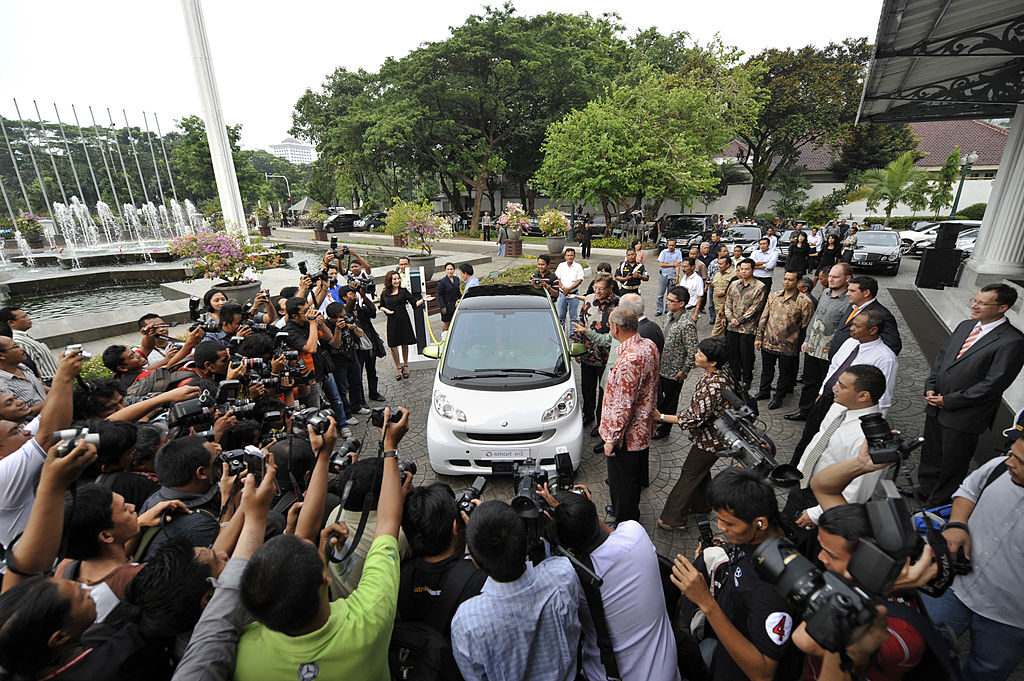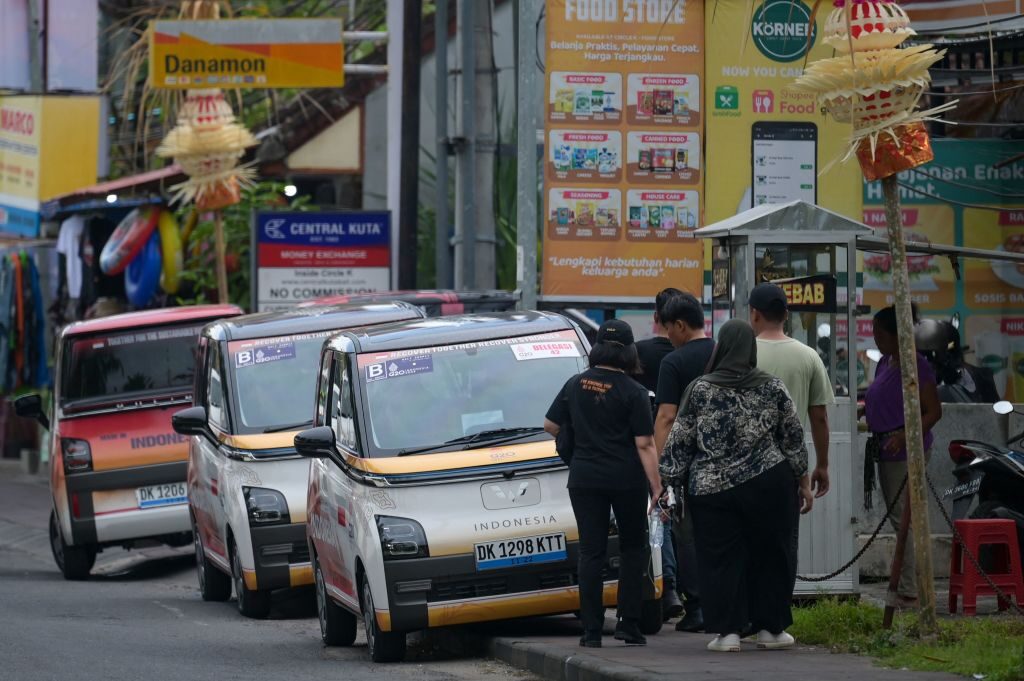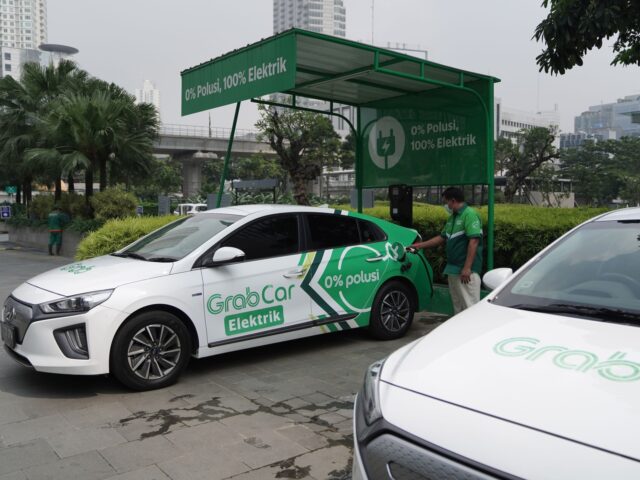A report published Monday by the tech website Rest of World (RoW) exposed the horrifying environmental cost of manufacturing all those “clean” electric vehicles.
RoW took a hard look at how the demand for crucial metals from China’s booming EV industry has ravaged parts of Indonesia, creating a hell on earth that might never be cleaned up.
RoW called its report The Dirty Road to Clean Energy: How China’s Electric Vehicle Boom Is Ravaging the Environment. The name highlights the uncomfortable truth that “green energy” proponents have decided to simply ignore the environmental devastation caused by hurried efforts to dig up the minerals needed for solar panels and batteries.
The Greens have been happy to outsource those dirty jobs to China, which knows how to talk a good game at climate change conferences but has very few compunctions about damaging the environment or pumping out “greenhouse gas” in pursuit of its industrial goals.
Green energy has also pumped money into one of the most repressive regimes on Earth and given Beijing abundant economic leverage over corporations in the free world.
RoW focused on the Indonesian island of Sulawesi, which has become something right out of an environmentalist propaganda cartoon: a once-unspoiled paradise turned into a grim hellscape by greedy corporations, to the dismay of the simple folk who live there. Nobody will make an environmentalist propaganda cartoon about Sulawesi or criticize the Chinese corporations that destroyed it, because they make electric vehicles.

File/Officials led by Jakarta Governor Fauzi Bowo (first R next to car) with Mercedes-Benz and Siemens officials hold the hand over ceremony for the “smart ed” the first electric car in Indonesia at the Jakarta city hall compound on November 24, 2010. (ROMEO GACAD/AFP via Getty Images)
People from the fishing village of Kurisa told RoW’s investigators their town is “dying” and their way of life is ending because corporations eager to dig up Indonesia’s rich lodes of nickel have poisoned the water and overheated the ocean:
Kurisa resident and fisherman Herdiantxo Anton, 32, told Rest of World that when he was a teenager, the clear water under the houses was full of wildlife, playing hide-and-seek in the coral that grew there. That was before large corporations began to set up nickel-processing factories in the villages nearby.
A few hundred meters from Kurisa is a coal plant that powers the nearby Indonesia Morowali Industrial Park (IMIP), a massive industrial complex occupied mostly by nickel-related industries and managed by a Chinese-Indonesian joint venture. Residents complain that IMIP’s operations, which started in 2015, have led to polluted waters.
“Before, we could see a needle at the bottom,” Anton told Rest of World, gesturing to the waters below a wooden walkway. “Now, it’s all mud.”
The report also blasted the IMIP plant for filling the atmosphere of Sulawesi with “sulfur dioxide, nitrogen oxides, and coal ash.” Residents of the surrounding villages complain of mounting health issues in addition to the loss of their fishing grounds. Kurisans said they could no longer leave their doors and windows open and were worried about allowing their children to play outdoors.
“We don’t eat fish anymore. We eat coal,” a local woman told RoW. Another villager complained of loud drilling operations running around the clock launched without any warning to the locals.
Most of Kurisa’s residents belong to an ethnic group called the Bugis, a Sunni Muslim people with ancient traditions who would surely become the beleaguered heroes in a Big Media exploitation narrative if their lands were being ruined by any other industry.
RoW explained the Indonesian nickel industry used to be less environmentally disruptive, but once President Joko Widodo decided to partner up with China and become a big player in the EV industry, the old safeguards were discarded. Indonesia’s EV strategy requires not just digging and exporting nickel but refining it for use in lithium electric car batteries, and the refining process requires huge coal-powered factories like the one near Kurisa.
One of the customers for these refined lithium products is Elon Musk’s Tesla, which signed a five-year contract with Chinese suppliers to buy processed Sulawesi nickel last summer.
Although the nickel mines and refineries examined by RoW are described as “joint ventures” between China and Indonesia, the Indonesians are very much junior partners in the enterprise. Bhima Yudhistira Adhinegara, director of the Center of Economic and Law Studies in Jakarta, noted that China controls a “dominant” 61 percent of Indonesian nickel production, versus about five percent for Indonesian state-owned companies.

People walk past parked G20 Summit official electric vehicles in Nusa Dua, Bali on November 12, 2022. (BAY ISMOYO/AFP via Getty Images)
Another Indonesian analyst, Ahmad Redi of the University of Tarumangara, worried that the price of China’s billion-dollar investments boosting the Indonesian economy was greater Chinese influence over Indonesia’s economy and government. The Chinese Communist Party is infamous for using its economic leverage to enforce compliance by foreign governments and corporations with its political agenda.
“The environmental damage and social conflict will cause Indonesia to suffer long-term losses,” Redi warned.
Sulawesi is not the only part of Indonesia, or indeed the world, to suffer environmental devastation in the rush to procure minerals made suddenly valuable by the forcible “adoption” of electric vehicles by politicians in the United States, Europe, and China. EV “demand” was conjured out of thin air by government policies like Europe’s ban on gas-powered vehicles, scheduled to take effect in 2035, and the massive government subsidies pumped into electric cars by the U.S. government.
This created a massive demand for the minerals needed to produce all those EV batteries, with a fairly short window of time before consumers are not just encouraged and subsidized but forced to buy electric cars. The corporations digging up those minerals cannot afford to be too fussy about the local environment, and the government-media-EV industrial complex cannot afford to pay too much attention to how tons of urgently needed nickel, cobalt, and lithium are mined and processed.
“In Chile, huge evaporation pools draw lithium out of the salt flats of the Atacama Desert, spawning arguments over water use and the rights of Indigenous people. In Congo, cobalt-mining operations blast the earth with such disruption that locals are forced to relocate. In Indonesia, the scramble for nickel has never been more urgent,” RoW observed.
Auto technology site Jalopnik on Monday cited the RoW report as “the latest example of how the EV transition is not as eco-friendly as the industry makes it out to be.”
“And in many places, including China and surrounding areas, the EV transition is woefully reliant on fossil fuels – not just for charging electric vehicles, but for their production, too,” Jalopnik added, touching on the other profoundly uncomfortable question about the mad dash for electric cars: where all of the electricity poured into those batteries will come from, especially if the environmentalist movement continues to oppose nuclear power.

COMMENTS
Please let us know if you're having issues with commenting.